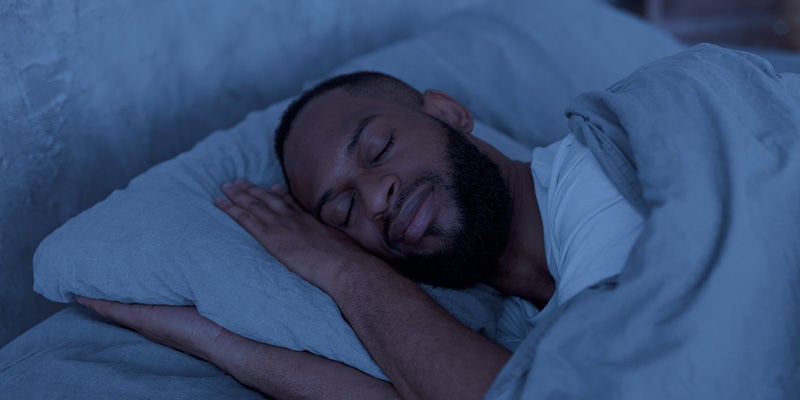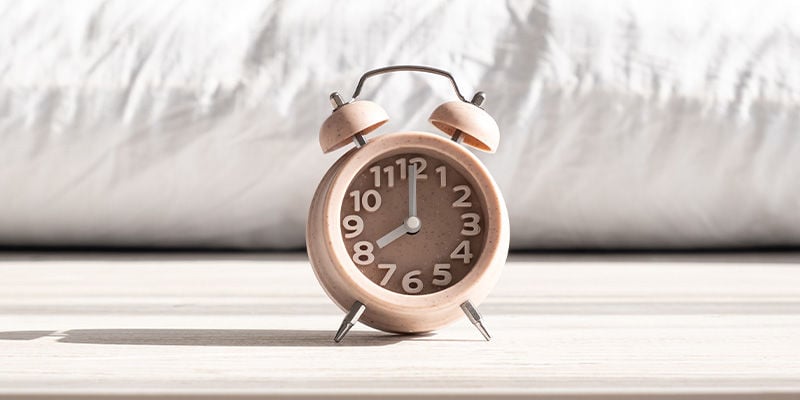
Why Sleep Is Vital For The Brain
Getting enough quality sleep is fundamental to our mental and physical health. It's not just about feeling awake and productive during the day—a decent amount of good sleep is key to leading a happy, healthy, and balanced life. But what exactly happens in the brain when we slumber, and why is a lack of sleep so detrimental? Read on to find out.
Sleep is a wonderful escape, and good sleep makes waking life an infinitely better place, too.
But what actually happens in our brains when we fall asleep, and what happens if we don’t get enough sleep? Getting a good night's rest is about much more than achieving feelings of wakefulness during the day—it is key to leading a healthy, happy life.
What happens to the brain when we sleep?

Sleep is one of the body and mind’s crucial needs. If we don’t sleep enough, the consequences can be fairly serious. From reduced cognitive performance (Killgore, 2010) to mental illness (Jamieson et al., 2020) and, in extreme cases, a correlation with death (Vaccaro et al., 2020)—a lack of sleep is bad news.
But what happens in the brain while we’re sleeping? What’s going on that is so vital to our existence?
There are four stages to sleep, and each stage is thought to serve a different purpose—although they are not fully understood. If we get a full night’s sleep, then we tend to cycle through these stages around six times per night, excluding the first stage, which only occurs once, as we fall asleep.
Different stages are thought to have particular roles. Deep sleep, also called slow-wave sleep, for example, is thought to affect physical recovery and help restore energy among other things (Halson & Juliff, 2017). On the other hand, REM sleep is associated with emotional and cognitive processing (Desseilles et al., 2011).
The brain and body exhibit specific and diverse signals depending on which stage of sleep they are in. Below, we'll delve deeper into each of these stages.
How much sleep is downtime versus maintenance?

Given the various stages, and the cyclic nature of sleep, getting enough sleep is important. As the brain and body need to spend plenty of time in a state of sleep in order to move through each stage enough times, getting just a bit of sleep will not suffice.
Eight hours per night is the number that’s generally recommended if people are to sleep healthily and avoid sleep deprivation. However, individual differences play a huge role in how much sleep a person really needs. Some people need more than eight hours a night to feel truly rested, while others can survive and be healthy on less (Hor & Tafti, 2009).
In fact, there appear to be a small number of people in the world who can live entirely healthily on four hours of sleep a night! For most people, though, this would lead to chronic sleep deprivation and serious health problems.
We are poorly educated when it comes to sleep patterns, and sleep more generally; most working models assume that everyone has uniform sleep needs and that, if these are not met, it is of little consequence.
The reality is, however, that good sleep is one of the most fundamental aspects determining an individual's quality of life. Sadly, most of us do not know how much we need, nor are we given the space to take it.
The different stages of sleep

There are four different stages to sleep. In each stage, the brain behaves very differently, appearing extremely calm in some, and resembling the waking brain in others (Carskadon et al., 2011).
NREM: Stage 1
Non-rapid eye movement stage 1 occurs only once per night, and happens as we fall asleep. This stage usually lasts for between one and ten minutes. During this stage, thoughts begin to scatter and we are very easy to wake.
It is not thought that anything is processed during this stage.
NREM: Stage 2
During stage 2, breathing and heartbeat decelerate, the body cools down, and brain activity reduces. However, there are short bursts of brain activity, which are thought to help people stay asleep and ignore external stimuli.
This stage lasts for between 10 and 25 minutes, becoming longer with each cycle.
NREM: Stage 3
This stage is also known as deep sleep or delta sleep. The latter name is given because delta waves can be observed in the brain during this stage. This period is when the brain is least active.
It is thought that deep sleep is when the body recovers and repairs, and when the immune system goes into action. Furthermore, though the mind (or, because the mind) is fully resting during this stage, deep sleep is thought to help with memory and creative thinking.
REM: Stage 4
The final stage is known as the rapid eye-movement (REM) stage. It gets this name because, despite usually being closed, the eyes move very fast during REM sleep. It is during this stage that we dream most vividly.
The brain appears to be most active in REM, to some degree resembling the waking brain. Dreaming remains a mystery, both to those who experience it and those who study it. However, it is thought that it helps to consolidate memories, process emotions, and generally benefit cognitive functioning.
REM sleep varies massively, with the first stages lasting a couple of minutes, and the latter ones lasting up to an hour.
Three reasons why sleep is important for brain health

Sleep is about much more than shutting off and feeling a bit better the next day. It’s as important as eating and drinking. If we sleep poorly, the brain and body are unable to properly repair themselves, and over time, this can have very damaging effects (A. Barone & C. Krieger, 2015).
Here are three key benefits of good sleep for brain health.
Helps to flush toxins
Studies suggest that, while sleeping, the brain removes toxins and essentially cleans itself (Xie et al., 2013). Researchers speculate that if the brain is unable to complete this process properly on a regular basis, it may increase the chances of developing a neurological disorder.
Influences neurological disorders
Beyond the removal of toxins, poor sleep has been linked to the buildup of β-amyloid (BA) in the brain (Shokri-Kojori et al., 2018). BA is linked to neurological disorders such as Alzheimer’s disease (AD). The exact processes are still unknown.
It could be that AD and similar conditions cause a buildup of BA. However, scientists are beginning to believe that poor sleep quality may cause higher concentrations of BA, which could in turn lead to AD.
Increases cognitive performance
Beyond serious neurological disorders, it is known that poor sleep quality undoubtedly affects cognitive performance. When tired, it is harder to form new memories or access old ones. Likewise, focusing on tasks, especially complex ones, becomes increasingly difficult (Alhola et al., 2007).
How sleep deprivation affects mental health

Perhaps most importantly, mood, mental health, and quality of life are hugely affected by sleep. Even a few nights of less-than-perfect sleep are enough to make it difficult to maintain a positive mood. Chronic insomnia (Robotham, 2011; Sivertsen et al., 2009) is linked to a host of different mental health problems, such as:
- Depression
- Anxiety
- Psychosis
- Loneliness
And when you compound these potential effects with the effects that sleep deprivation has on a person’s wider life—such as difficulty maintaining relationships, poor performance at work, and an inability to exercise or engage in hobbies—they become much worse.
Getting the sleep your brain needs
By now, it's probably clear that getting enough sleep on a regular basis is key to leading a healthy, happy life. It’s a mystery as to why sleep is often discounted as an unnecessary indulgence in our society, rather than respected as something essential. Although, attitudes are shifting.
Make the space in your life for ample sleep, and, as philosopher John Gray says in his book Feline Philosophy: Cats and the Meaning of Life, “Sleep for the joy of sleeping. Sleeping so that you can work harder when you wake up is a miserable way to live. Sleep for pleasure, not profit”.
- Alexandra Vaccaro, Yosef Kaplan Dor, Keishi Nambara, Elizabeth A. Pollina, Cindy Lin, Michael E. Greenberg, & Dragana Rogulja. (2020/06/11). Sleep Loss Can Cause Death through Accumulation of Reactive Oxygen Species in the Gut - https://www.cell.com
- Carskadon, M.A., & Dement, W.C. (2011). Normal Human Sleep: An Overview. Principles and Practice of Sleep Medicine. M.H. Kryger (Ed.) - https://www.researchgate.net
- Daniel A. Barone, & Ana C. Krieger. (2015). The Function of Sleep, The Function of Sleep - http://www.aimspress.com
- Desseilles, M., Dang-Vu, T. T., Sterpenich, V., & Schwartz, S. (2011/12/01). Cognitive and emotional processes during dreaming: A neuroimaging view - https://www.sciencedirect.com
- Halson, S. L., & Juliff, L. E. . (2017/01/01). Sleep, sport, and the brain - https://www.sciencedirect.com
- Hor, H., & Tafti, M. (2009). How Much Sleep Do We Need? - https://www.science.org
- Jamieson, D., Broadhouse, K. M., Lagopoulos, J., & Hermens, D. F. (2020/02/01). Investigating the links between adolescent sleep deprivation, fronto-limbic connectivity and the Onset of Mental Disorders: a review of the literature - https://www.sciencedirect.com
- Killgore, & W. D. . (2010/01/01). Effects of sleep deprivation on cognition - https://www.sciencedirect.com
- Paula Alhola, & Päivi Polo-Kantola. (2007, October). Sleep deprivation: Impact on cognitive performance - https://www.ncbi.nlm.nih.gov
- Robotham, & D. (2011). Sleep as a public health concern: insomnia and mental health | Emerald Insight - https://www.emerald.com
- Shokri-Kojori, E., Wang, G. J., Wiers, C. E., Demiral, S. B., Guo, M., Kim, S. W., Lindgren, E., Ramirez, V., Zehra, A., Freeman, C., Miller, G., Manza, P., Srivastava, T., De Santi, S., Tomasi, D., Benveniste, H., & Volkow, N. D. . (2018). Amyloid accumulation in the human brain after one night of sleep deprivation - https://www.pnas.org
- Sivertsen, B., Krokstad, S., Øverland, S., & Mykletun, A. (2009/08/01). The epidemiology of insomnia: Associations with physical and mental health.: The HUNT-2 study - https://www.sciencedirect.com
- Xie, L., Kang, H., Xu, Q., Chen, M. J., Liao, Y., Thiyagarajan, M., O’Donnell, J., Christensen, D. J., Nicholson, C., Iliff, J. J., Takano, T., Deane, R., & Nedergaard, M. (2013). Sleep Drives Metabolite Clearance from the Adult Brain - https://www.science.org
-
 1 min
November 6, 2017
Best Incense For Relaxation And Sleep
Here at Zamnesia, we bring you all sorts of herbs. Herbal incense is a safe and cost-effective way to unwind. Discover our best varieties of incense for easing the mind, body and soul.
1 min
November 6, 2017
Best Incense For Relaxation And Sleep
Here at Zamnesia, we bring you all sorts of herbs. Herbal incense is a safe and cost-effective way to unwind. Discover our best varieties of incense for easing the mind, body and soul.
-
 3 min
May 17, 2017
Sleep Masks And Lucid Dreaming
A sleep mask can be a great help with relaxation and meditation, and if we want a good night’s sleep. But did you know that a sleep mask can also be an excellent lucid dreaming aid? There are...
3 min
May 17, 2017
Sleep Masks And Lucid Dreaming
A sleep mask can be a great help with relaxation and meditation, and if we want a good night’s sleep. But did you know that a sleep mask can also be an excellent lucid dreaming aid? There are...





 United States
United States










